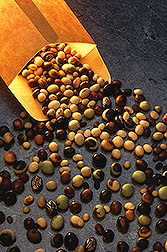New Method Simplifies Biodiesel Production
|
|
ARS scientists in Wyndmoor, Pennsylvania, have modified biodiesel production technology. Their method eliminates a step—and an air-polluting chemical—from the process of synthesizing the fuel.
Michael Haas, a biochemist with the Eastern Regional Research Center's Fats, Oils, and Animal Coproducts Research Unit, and colleagues developed the new approach.
In this country, soybean oil is the most prevalent starting material for biodiesel, though other vegetable oils, animal fat, and waste grease are used too. But soybean oil's relatively high cost results in biodiesel being expensive, which discourages wider adoption of this desirable, renewable fuel.
In biodiesel production, hexane, a colorless, flammable liquid derived from petroleum, is traditionally used to extract the oil from the soybeans. But hexane is an air pollutant, and its release is regulated by the U.S. Environmental Protection Agency. Working with ERRC biologist Karen M. Scott and chemist Thomas A. Foglia, Haas eliminated hexane from the process simply by skipping the oil-extraction step that relies on it. Instead, Haas explains, soybean flakes are incubated with methanol and sodium hydroxide—the same agents that would be used to process extracted oil.
"In the new method, soybean flakes are incubated in alkaline methanol, eliminating the need to isolate and purify the oil before transesterification." ("Transesterification" is a reaction between fats and alcohol that forms the simple fatty acid esters that are biodiesel.) The lipids don't have to be isolated first because transesterification occurs in the raw soy flakes containing the oil.
Next, when the researchers collaborated with Andrew McAloon, a process modeler/cost engineer at their facility, to estimate and compare costs, they hit a snag. Without even accounting for the cost of the soy flakes or soy oil, a gallon of biodiesel produced by their new process was estimated to cost $3.14—versus 38 cents per gallon if produced by the conventional process.
The researchers then noticed that their new method used considerably more methanol than is typically needed in biodiesel synthesis. They reasoned that the moisture naturally present in soybeans, as much as 10 percent in soy flakes, could be the reason behind the high methanol requirement. They found that by drying the flakes before starting the biodiesel synthesis, they could greatly reduce the required methanol volume. As a result, the estimated cost went down to $1.02 per gallon.
Haas and his colleagues are presently refining their economic model to account for income from selling the lipid-free, protein-rich flakes left after the biodiesel reaction for use as animal feeds and to account for cost differences between refined-oil and flaked-soybean starting materials.
ARS has filed a patent application on the process. Haas is exploring use of this new method to produce biodiesel from the lipids in corn co-products from ethanol plants that use corn as a starting material. He's also investigating the suitability of canola seeds and meat and bone meal.—By Jim Core, Agricultural Research Service Information Staff.
This research is part of Bioenergy and Energy Alternatives, an ARS National Program (#307) described on the World Wide Web at www.nps.ars.usda.gov.
Michael J. Haas is in the Fats, Oils, and Animal Coproducts Research Unit, USDA-ARS Eastern Regional Research Center, 600 East Mermaid Ln., Wyndmoor, PA 19038; phone (215) 233-6459, fax (215) 233-6795.
"New Method Simplifies Biodiesel Production" was published in the April 2005 issue of Agricultural Research magazine.







